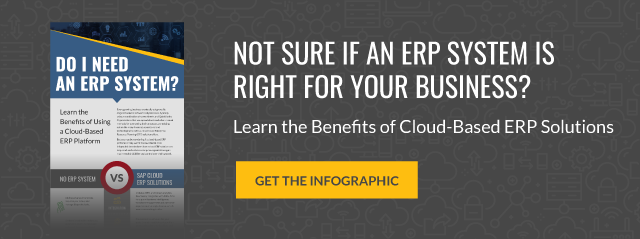Growing businesses need software that grows alongside them. But how can you tell when it’s time to invest in the operational efficiencies, industry best practices and leading third-party integrations that a next-generation ERP (Enterprise Resource Planning) solution enables?
Though resistance to change can make some organizations hesitant to leave their legacy accounting systems behind, postponing the implementation of a cloud ERP can lead to drawbacks and missed benefits. Even enterprise accounting solutions lack the scalability, configurability and seamless integrations of a cloud ERP solution.
This blog post is designed to help growing businesses of all sizes and industries recognize when they’ve outgrown their accounting software – and what they can gain by adopting a leading cloud solution.
Sign #1: You Need More Visibility and Predictability
Having control over your growth requires a top-down view of your operations. Continuing to leverage accounting software like QuickBooks results in siloed information and limited, if any, reporting capabilities. Leading ERPs, on the other hand, offer extensive KPIs (Key Performance Indicators) and on-demand reports that integrate with everything from payroll to your warehouse.
Not only can cloud ERP immediately reduce end-of-month closing time by around 50%, the reporting features of leading cloud solutions also enable improved transparency and forecasting. For example, SAP Business ByDesign includes inventory valuation functionality to help you track profitability and optimize your decision-making process.
Sign #2: You Want to Embrace E-commerce
Taking advantage of e-commerce means managing multiple channels of your operations at once. Beyond just accounting, an omni-channel approach involves everything from warehouse and inventory to marketing and mobile.
While legacy accounting software silos information, creating operational inefficiencies, omni-channel cloud solutions allow you to integrate your finances with your entire supply chain. With automated billing and invoicing, plus other innovative tools and add-ons, cloud ERPs enable easier e-commerce functionality and Agile warehouse management.
Sign #3: You Have a Growing User Base
Accounting systems like QuickBooks can only support interactions among a limited number of users. Cloud ERPs operate on a subscription model that scales to what and who you need. With extensive training and support built in, there’s no need to staff a larger team to support your solution.
Keep in mind that accounting software’s reliance on manual processes can burden your accounting department and create problems with duplicate entries and inventory shortages.
As you continue to add users, cloud ERP helps reduce these risks and growing pains with automated efficiencies and best practices.
Sign #4: You Want to be Proactive About Security and Compliance
Another major drawback of accounting software is its lack of backup and disaster recovery. A cloud-native solution like SAP Business ByDesign not only eliminates issues related to on-premises infrastructure, it also creates automated records and provides a single source of truth in the event of audits or other contingencies.
Plus, solutions like SAP Business ByDesign come equipped with industry best practices, enabling you to address compliance requirements right out of the box. This in turn frees up your IT team to focus on growth, rather than troubleshooting issues or maintaining conformance with industry regulations.
Sign #5: You’re Setting Limitations on Your Business Goals
For growing businesses, cloud ERP isn’t a matter of “if” but “when.” Whether you’re opening a line of new business or expanding internationally, sustaining profitable growth requires the scalability and configurability that leading cloud ERPs provide.
For example, SAP Business ByDesign is equipped with built-in multi-country and multi-currency functionality. Adopting cloud ERP means enabling these crucial ingredients for growth, plus benefiting from features and best practices sooner rather than later.
Cloud ERPs don’t just make more business sense than accounting software – they also create more opportunities for growth. Growing businesses will have to leave their accounting software behind at some point. So why not start taking advantage of a leading ERP solution today?




